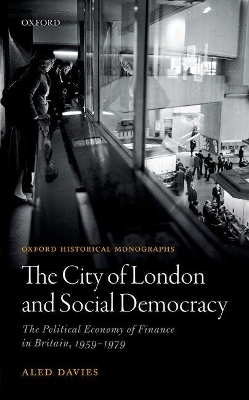
The City of London and Social Democracy
The Political Economy of Finance in Britain, 1959 - 1979
Seiten
2017
Oxford University Press (Verlag)
978-0-19-880411-6 (ISBN)
Oxford University Press (Verlag)
978-0-19-880411-6 (ISBN)
How and why did social democracy give way to neoliberalism in Britain in the late twentieth century? Aled Davies asks these questions in this exploration of the City of London and its relationship with the post-war social democratic State.
The City of London and Social Democracy examines the relationship between the financial sector and the state in post-war Britain.
The key argument made in Aled Davies's study is that changes to the financial sector during the 1960s and 1970s undermined the state's capacity to sustain and develop a modern industrial economy. Social democratic economic strategy was constrained by the institutionalization of investment in pension and insurance funds; the fragmentation of the nation's oligopolistic domestic banking system; the emergence of an unregulated international capital market based in London; and the breakdown of the Bretton Woods international monetary system. Novel attempts to reconfigure social democratic economic strategy in response to these changes ultimately proved unsuccessful. Meanwhile, the assumption that national prosperity could only be achieved through industrial growth was challenged by a reconceptualization of Britain as a fundamentally financial and commercial nation -- an idea that was successfully promoted by the City itself. These findings assert the need to place the Thatcher governments' subsequent neoliberal economic revolution, which saw the acceleration of deindustrialization and the triumph of the City of London as a pre-eminent international financial centre, within a broader material, institutional, and cultural context previously underappreciated by historians.
The City of London and Social Democracy examines the relationship between the financial sector and the state in post-war Britain.
The key argument made in Aled Davies's study is that changes to the financial sector during the 1960s and 1970s undermined the state's capacity to sustain and develop a modern industrial economy. Social democratic economic strategy was constrained by the institutionalization of investment in pension and insurance funds; the fragmentation of the nation's oligopolistic domestic banking system; the emergence of an unregulated international capital market based in London; and the breakdown of the Bretton Woods international monetary system. Novel attempts to reconfigure social democratic economic strategy in response to these changes ultimately proved unsuccessful. Meanwhile, the assumption that national prosperity could only be achieved through industrial growth was challenged by a reconceptualization of Britain as a fundamentally financial and commercial nation -- an idea that was successfully promoted by the City itself. These findings assert the need to place the Thatcher governments' subsequent neoliberal economic revolution, which saw the acceleration of deindustrialization and the triumph of the City of London as a pre-eminent international financial centre, within a broader material, institutional, and cultural context previously underappreciated by historians.
Aled Davies completed a DPhil in History at the University of Oxford in 2014. Prior to this he received an undergraduate degree in History from the University of Exeter, and a Master's degree in Economic and Social History from the University of Oxford. He is currently employed as a post-doctoral research associate at the University of Bristol.
Introduction
1: 'Pension Fund Socialism': Institutional Investment and Social Democracy
2: The Politics of Banking and Social Democracy
3: The Limits of Financial Reform and the Challenge to Social Democracy in the 1970s
4: The City of London and the Politics of 'Invisibles'
5: The City of London and the Evolution of British Monetarism
Conclusion
Bibliography
| Erscheinungsdatum | 28.09.2017 |
|---|---|
| Reihe/Serie | Oxford Historical Monographs |
| Zusatzinfo | 11 black and white figures/illustrations |
| Verlagsort | Oxford |
| Sprache | englisch |
| Maße | 156 x 223 mm |
| Gewicht | 422 g |
| Themenwelt | Geschichte ► Allgemeine Geschichte ► Zeitgeschichte |
| Geisteswissenschaften ► Geschichte ► Regional- / Ländergeschichte | |
| Geschichte ► Teilgebiete der Geschichte ► Wirtschaftsgeschichte | |
| Wirtschaft ► Betriebswirtschaft / Management ► Finanzierung | |
| Wirtschaft ► Volkswirtschaftslehre ► Wirtschaftspolitik | |
| ISBN-10 | 0-19-880411-3 / 0198804113 |
| ISBN-13 | 978-0-19-880411-6 / 9780198804116 |
| Zustand | Neuware |
| Informationen gemäß Produktsicherheitsverordnung (GPSR) | |
| Haben Sie eine Frage zum Produkt? |
Mehr entdecken
aus dem Bereich
aus dem Bereich
eine Deutschlandreise im Jahr 1958
Buch | Hardcover (2024)
C.H.Beck (Verlag)
20,00 €
wie Freud im Kollektiv verschwand
Buch | Hardcover (2024)
Klett-Cotta (Verlag)
25,00 €


